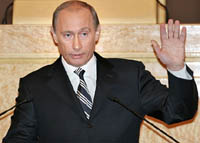Presidential race starter in Russia

Russia announced the campaign period for March 2 presidential election officially opened Wednesday.
The election date was published in the legislature's official gazette, giving political parties until Dec. 23 to nominate their candidates. Aspirants who want to put forward their candidacies without party support must file by Dec. 18.
President Vladimir Putin is constitutionally barred from seeking a third consecutive term, and it is unclear whom his party intends to nominate. Putin's popularity is seen as virtually guaranteeing victory for whomever the United Russia party names as its candidate.
An array of politicians have declared they intend to run for president. Among them is Garry Kasparov, the former world chess champion who has led a series of protest marches this year, including one last weekend in which he was arrested and sentenced to five days in jail.
Others include Communist Party leader Gennady Zyuganov; Mikhail Kasyanov, who was Putin's first prime minister but now has entered the opposition; Grigory Yavlinsky, head of the liberal Yabloko Party; and Vladimir Bukovsky, a Soviet-era dissident who now lives in London.
Putin has repeatedly said he will not seek to circumvent the constitutional ban on running for a third term, but he also has given strong indications that he aims to wield substantial power after leaving the presidency.
Last month, he said he could foresee becoming prime minister. That led to wide speculation that he then would seek to change the constitution to give more power to that post.
This month he said that if United Russia scores a big win in Sunday's parliamentary election - as is widely expected - he would have a "moral right" to hold lawmakers and government officials accountable for implementing his policies.
Whether international monitors will have a substantial presence in Russia for the presidential election is unclear. The election monitoring arm of the Organization for Security and Cooperation in Europe, whose assessments of elections are widely influential, said it would not send observers to Sunday's election because Russia's delay in granting them visas undermined their ability to do a thorough assessment.
On Wednesday, the newspaper Nezavisimaya Gazeta quoted Christian Strohal, the head of the OSCE's election-monitoring operations, as saying, "As far as I know, the issue of inviting ... observers for the March election has yet to be solved."
"The sooner there is an answer from Moscow, the better. I would like to have it right now," Strohal was quoted as saying.
Russian officials have complained that the group's reports on disputed elections in Georgia and Ukraine galvanized protesters and helped bring Western-oriented leaders to power.
Subscribe to Pravda.Ru Telegram channel, Facebook, RSS!


